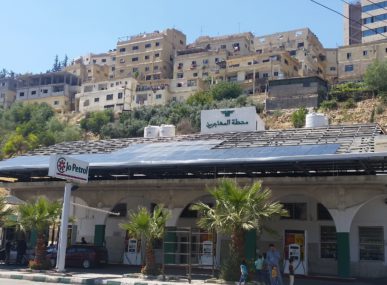As its name suggests, Frida EcoBike is a bicycle-based, solar-powered coffee shop. It is not a traditional two-wheel cycle, and bears more resemblance to the three-wheeled bikes used as auto-rickshaws in various parts of the world.
Beirut, Lebanon
Renewable Energy and Energy Efficiency
Beirut residents now have a new way to get their morning coffee — and instead of establishing itself at the nearest trendy street corner, Frida EcoBike brings the caffeine to you.
Sharbel Maroun, a mechanical engineer and serial entrepreneur, used his skills to build the Frida EcoBike from scratch. Maroun is a Managing Partner of Coffee and Co Group, the Beirut business launching the Frida EcoBike business. In addition to this latest initiative, Maroun and his team oversee the design and maintenance of coffee machines in the Middle East, and have created Frida Coffee, a brand of craft coffee beans that is distributed across the Lebanese market.
A mobile coffee shop, built in Beirut:
Designing the EcoBike took Maroun’s coffee machine craftsmanship to the next level. “We didn’t just put a coffee machine on the bike — everything we’ve done is embedded and connected directly to the bike,” Maroun explains. The result is a surprisingly streamlined black and stainless steel bike, fit with a coffee grinder, an espresso machine, and a smoothie bar.
The EcoBike’s crowning glory is its solar panels: three large 250-watt panels, and one smaller panel, mounted at the top, back, and sides of the bike. Those panels recharge the bike’s six batteries, and produce enough energy to power the electric features of the bicycle, as well as its coffee and smoothie making machinery.
The panels come from Dawtec, a green technology company based in Beirut. According to Founder Wissam Daou, this is the first time the company has seen their solar panels installed on such a mobile project. Daou says there is great awareness that can be gained from having solar panels powering such a public project. “We believe having our solar panel installed on any application is a profit to our company, Lebanon, the region, and the world,” he says. “We look forward to more innovative ideas from Sharbel, and we are always ready to support others in Lebanon and other parts of the world with their innovative, green ideas.”
As for Maroun, he wants people to see that solar energy is a viable way to reduce pollution and run a business. “We want the EcoBike to be a movable billboard to prove that you can use solar energy to power a coffee shop,” he says.
Coffee culture for middle-income Beirut:
There is a large market opportunity for a mid-level coffee option in Beirut, says Rami Haidar, a Lebanon-based coffee consultant working with EcoBike on their launch. Haidar has more than 15 years of experience working with international chains such as Starbucks and Second Cup. “People drink coffee everywhere in Beirut, especially in social gatherings,” he says. “The market gap is in the middle class and finding affordable coffee prices for them.”
This is the market opportunity EcoBike plans to fill. “People either buy coffee locally off the street or they go to Starbucks and overpay for what they get,” Maroun notes. “We are a middle-of-the-line coffee that is both flavorful and affordable.”
EcoBike promises to have all the classic coffee drinks at a reasonable price: cappuccinos, macchiatos, mochas, Americanos, and more, as well as cold coffee and non-coffee based drinks. “We will also be the first company in the Middle East to serve the cold brew,” Maroun proudly added, referring to the pre-brewed coffee drink that delights warm weather sippers everywhere. “Even Starbucks doesn’t sell that in Lebanon.”
The EcoBike’s smoothie bar will also be serving up flavors featuring strawberry, mango, peach, chocolate, and more. Do not forget a snack — cupcakes are also on the menu in the coming months.
In line with its environmentally friendly mission, EcoBike will be serving all its drinks in biodegradable paper cups. “We’re trying to push for a new way of thinking, so we are also encouraging people to bring their own cups,” Maroun says.
Rolling out the EcoBike:
The EcoBike will officially hit the streets on September 23 — Maroun chose the date in honor of his wife’s birthday, and because the weekend offers the opportunity to catch pub and nightclub traffic. Steaming cups of coffee will be doled out for free on opening weekend in Beirut’s fashionable Mar Mikhaël neighborhood — an attempt to get people talking and snapping pictures of the latest addition to Beirut’s coffee scene.
The EcoBike’s permanent location will be a little more low-key. In the morning, the bike will be parked on the Dbayeh Highway traffic area on the way into Beirut. To catch afternoon traffic, the bike’s location will switch to the other side of the highway after lunch. “We also have the acceptance of five municipalities to bring our bike there,” Maroun adds. In preparation for expansion following this initial testing launch, Coffee and Co Group has bought and imported five additional bicycles ready to be refurbished as mobile coffee shops.
“We really want our model to show that everything can be operated in an environmentally minded way,” Maroun says in conclusion. “Solar energy can contribute at a large scale to our daily life — even when it comes to something as simple as a coffee shop.”



